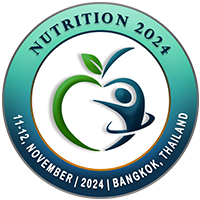
Hened Farah
Nova Wellness Center, MexicoTitle: Association between the consumption of different dietary protein sources and glomerular filtration rate in healthy individuals and in individuals with diabetes mellitus type 2 with and without diabetic nephropathy
Abstract
Introduction: Type 2 diabetes (T2D) has become a priority health problem. Diabetic Kidney Disease (DKD) is the most common complication of diabetes and the main cause of end-stage renal disease (ESRD). T2D and diabetes complications are associated with cardiovascular morbidity and mortality, which have a significant impact on economic spending on individuals’ health and quality of life. The last systematic review where the effects of protein restriction on DKD were studied was published in 2009 and included 12 studies; few of them analyzed the source of protein (red meat, poultry, fish or vegetables). The results were not conclusive due to the small size and representativeness of the groups.
Methodology: A cross-sectional study was conducted with the individuals of the original cohort of the project “Search for early renal disease biomarkers associated with diabetes”, which consisted of 200 individuals divided into three groups: healthy, diabetic without DKD and diabetic with DKD. The objective of this study was to analyze the relationship between the glomerular filtration rate and the consumption of different sources of dietary protein (animal vs. vegetable). This research was conducted in collaboration with the National Institute of Genomic Medicine and the National Institute of Nutrition and Medical Sciences “Salvador Zubirán”. The analysis of the total consumption and the different sources of protein was made through a questionnaire of frequency of food consumption, evaluated by Food Processor. Blood and 24-hour urine samples for characterization of renal function and biochemical analysis were obtained. The normality of the data was analyzed through D'Agostino Pearson, and a descriptive, inferential analysis with one-way ANOVA with posthoc of Tukey and correlation of Pearson was performed. All variables were analyzed using PRISMA v5 considering as significant all estimates with a value of p <0.05.
Results: A final sample of 57 Mexican individuals was included in the analysis, out of which, 12 were healthy individuals, 30 had T2D and 15 had T2D with DKD. The factors likely related were: age between groups (p <0.0001), presence of dyslipidemias (p = 0.0007) and waist-to-hip ratio (p <0.05). The prevalence of systemic arterial hypertension (SAH) was found in both: individuals with and individuals without DKD, without significant differences (63.3% and 66.7% respectively). The average total dietary protein intake was 1.05 gr/kg of body weight per day in healthy individuals, 0.81 gr/kg per day in T2D without DKD and 0.89 gr/kg per day in DM2 with DKD, with a predominantly higher consumption of animal protein in all three groups. Positive significant correlations were found (p <0.05) between the consumption of total protein (r = 0.52) and vegetable protein (r = 0.60) with the glomerular filtration rate, for individuals with T2D without DKD. As for the rest of the healthy individuals and with T2D with DKD no meaningful correlations were found.
Conclusions: The total intake of dietary vegetable and animal protein is not related to the prevalence of DKD in this cohort of Mexican individuals. Given the prevalence of DKD, the performance of controlled clinical studies with isoenergetic diets should be considered (with animal and vegetable proteins), in order to evaluate and corroborate the robustness of the results found in this research.
Biography
Hened Farah is a skilled medical professional specializing in clinical nutrition. She completed her medical studies at the Mexican Faculty of Medicine, La Salle, and pursued further education at the University Anáhuac Norte, earning a Master's in clinical nutrition. Certified by the Mexican College of Clinical Nutrition and Nutritional Therapy and the World Obesity Federation, Dr. Farah dedicates her life to delivering high-quality care. As a partner at the Nova Wellness Center, she utilizes her expertise to develop personalized nutrition plans, helping individuals achieve their health and wellness goals. Dr. Farah is passionate about promoting healthy living and strives to positively impact her patients' lives through her work in clinical nutrition,

